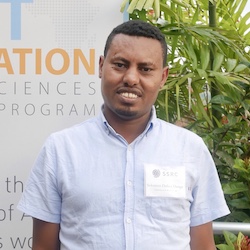Bio
Solomon Dribsa Danga is a PhD candidate in the Department of Social Work, Child and Family Studies Unit at the University of the Western Cape, South Africa. He also works as a lecturer in the Department of School and Counselling Psychology at Woldia University, Ethiopia. He has earned his MA in developmental psychology and BA in educational psychology from Addis Ababa University, Ethiopia. His PhD Dissertation focuses on “Mental health of adolescents in refugee camps in Ethiopia: The development of an exploratory model based on trauma, coping and resilience.” Adolescents living in refugee camps are exposed to unique stressors such as living in active war zones, higher levels of physical and sexual violence, minimal access to shelter, food, water, and education. Ethiopia hosts the second largest number of refugees in Africa. The majority of the refugees hosted in Ethiopia are from South Sudan, with more than 65 percent younger than 18 years old, exposed to traumatic events with high risk for poor mental health. Despite trauma, extreme hardships and/or deprivation, many children and adolescents recover from such life events. However, the current research does not provide clarity regarding this risk. Danga’s study therefore aims to test a model that examines the total effects of the relationship between trauma, coping, resilience on the mental health of adolescents in refugee camps in Ethiopia. He is a recipient of the Next Generation Social Science in Africa Dissertation Research Fellowship for 2019.

